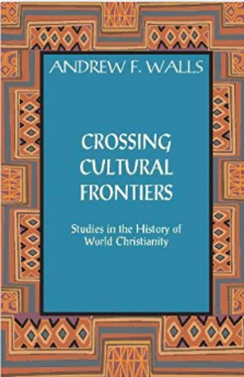posts
 Andrew F. Walls. Crossing Cultural Frontiers: Studies in the History of World Christianity. Maryknoll: Orbis, 2017. xii + 284 pp. $32 [note: this was published in Themelios 43:1 (2018), 167-168]. Crossing Cultural Frontiers is the most recent work from Andrew Walls, an eminent scholar of history of Christian mission and world Christianity. Previously a missionary to Sierra Leone, Walls’ academic career has included professorships at the University of Edinburgh, Liverpool Hope University, and Afroki-Christaller Institute (Ghana). The present work is a “best of Walls” compilation comprising works published in other journals and books. In fact, it is the third such “best of” compendium. The previous two include The Missionary Movement in Christian History (1996) and The Cross-Cultural Process in Christian History (2002). The essays in the volume are grouped into three sections. In the first, “The Transmission of Christian Faith,” Walls argues for the multi-cultural and global nature of early Christianity (chap. 1), presents Origen as the father of mission studies (chap. 2), and discusses worldview, including how much of a believer’s culture and previous religion stay with them at Christian conversion (chap. 3). By juxtaposing Adamic (forced out) vs. Abrahamic (voluntary going) migration, Walls offers a theology of migration (chap. 4). Finally, he argues that studying Christian history is a cross-cultural exercise (chap. 5). In part two, “Africa in Christian Thought and History,” Walls explores world Christianity in the region of the world that he knows best. He explores a history of African discipleship through suffering (chap. 6), the eighteenth-century “Christian experiment” of the Sierra Leone colony (chap. 7), and nineteenth-century attempts to cultivate Christianity in the vernacular in West Africa (chap. 8). He completes the section by showing how African traditional religions began to be studied (chap. 9), and how the Ghanian scholar Kwame Bediako exemplified African Christian scholarship (chap. 10). In the final part, Walls focuses on “The Missionary Movement and the West.” In this he dedicates chapters to how western missions and missionaries are portrayed in English literature (chap. 11), John and Charles Wesley’s theology and practice of mission (chap. 12), and the legacy of mission literature—particularly Jonathan Edwards’ Life of Brainerd (chap. 13). In the remaining chapters, Walls discusses an African (Tiyo Sago) and Indian (Behari Lal Singh) scholar living in Britain and being exemplars of world Christianity (chap. 14), western missionaries in China committed to vernacular and indigenous Christianity (chap. 15), and the work of Harold Turner who sought to grasp indigenous Christianity with an eye toward traditional religions (chap. 16). In a brief concluding chapter, Walls reflects on the vocation of missiology. As only Walls can put it, he writes, “Missiologists are the magpies of the academic world; they invade the scholarly territory of their neighbors and steal their topics . . . the biblical field, the theological field, the historical field, and the practical field in the name of the study of mission . . . This also makes them academic subversives, upsetting harmony by raising new issues; introducing new perspectives and new data; identifying new questions and problems within established fields” (p. 259). There is much to appreciate in this collection of Walls’ essays and I will highlight two areas. First, Walls’ lifelong exploration of indigenous Christianity—the gospel at home in every culture—is well teased out in this volume. Beginning with the question, what does it mean to be a Greek (or African or other) Christian?, he illustrates this reality through a survey of the early church in general, and individuals such as Antony, Origen, Kwame Bediako, Tiyo Sago, and Behari Lal Singh (chaps. 1-2, 10, 14). He explores the eighteenth and nineteenth-century vernacular translation work of missionaries in West Africa and also China, including the struggles and failures to achieve local Christianity (chaps. 8, 15). In his study of conversion (chap. 3) and Harold Turner’s study of pre-Christian religions (chap. 16), he wrestles with the authentic cultural and religious identity of local Christians. In short, this volume offers a rich collection of case studies for indigenous and world Christianity. Second, Walls’ discussion on theology of migration (chap. 4) contained fresh insights. His paradigm of forced (Adamic) vs. voluntary (Abrahamic) migration sets a framework for peoples on the move in Scripture and throughout history. Further, his emphasis on Greater European Migration from the fifteenth to twentieth centuries is important because it offers a context for understanding colonialism and the founding of new nations, while also offering context for the reverse migration to Europe and the West which has taken place in the twentieth and twenty-first centuries. These historical and theological reflections are needed by the church in the West today. To these points of appreciation, I raise two questions for critique. First, I applaud Walls for highlighting Origen as the father of mission studies (chap. 2). Origen showed how one could be thoroughly Christian and thoroughly Greek and thoroughly Egyptian and he praised the work of itinerant evangelists. However, can we call someone the father of mission studies who lacked personal and practical experience in cross-cultural mission engagement? Second, Walls has helped the reader understand the identity of a Christian believer situated in a local culture with a pre-Christian past (chap. 3). Conversion is a messy process as the gospel makes its home in a given culture. However, I think Walls could have given more space to discussing how and when local Christianity turns into idolatry or syncretism. To borrow from Walls, what does it look like for the gospel to be a pilgrim message (exhorting, critiquing, being prophetic) within a given context? All said, it was a pleasure to sit with Professor Walls on this journey. His call to do church history as a global, cross-cultural exercise (chap. 5) has certainly shaped this reader’s academic and professional path. Comments are closed.
|
Archives
November 2023
|
 RSS Feed
RSS Feed
